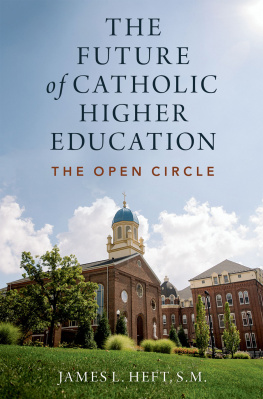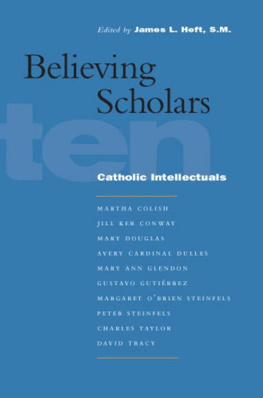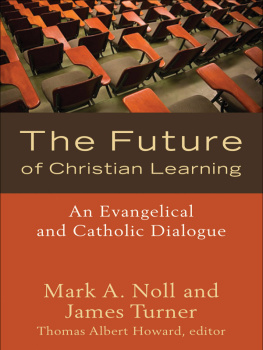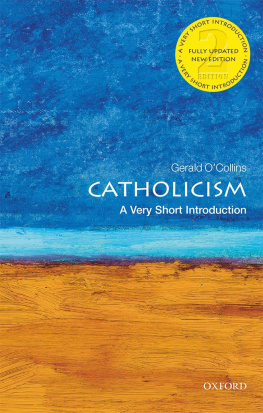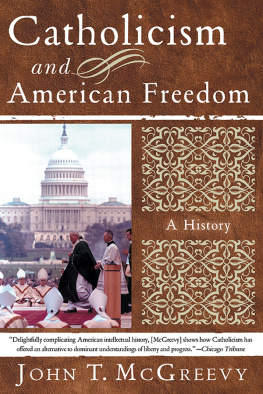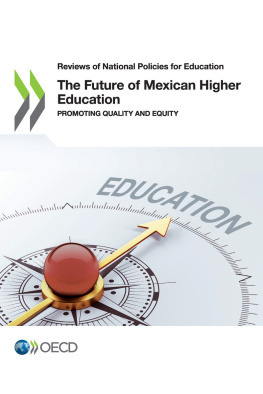The Future of Catholic Higher Education

Oxford University Press is a department of the University of Oxford. It furthers the Universitys objective of excellence in research, scholarship, and education by publishing worldwide. Oxford is a registered trade mark of Oxford University Press in the UK and certain other countries.
Published in the United States of America by Oxford University Press
198 Madison Avenue, New York, NY 10016, United States of America.
Oxford University Press 2021
All rights reserved. No part of this publication may be reproduced, stored in a retrieval system, or transmitted, in any form or by any means, without the prior permission in writing of Oxford University Press, or as expressly permitted by law, by license, or under terms agreed with the appropriate reproduction rights organization. Inquiries concerning reproduction outside the scope of the above should be sent to the Rights Department, Oxford University Press, at the address above.
You must not circulate this work in any other form and you must impose this same condition on any acquirer.
Library of Congress Cataloging-in-Publication Data
Names: Heft, James, author.
Title: The future of Catholic higher education : the open circle / by James L. Heft, S.M.
Description: New York : Oxford University Press, [2021] |
Includes bibliographical references and index.
Identifiers: LCCN 2020058612 (print) | LCCN 2020058613 (ebook) |
ISBN 9780197568880 (hardback) | ISBN 9780197568903 (epub)
Subjects: LCSH: Catholic universities and collegesPhilosophy.
Classification: LCC LC487.H44 2021 (print) | LCC LC487 (ebook) |
DDC 378/.0712dc23
LC record available at https://lccn.loc.gov/2020058612
LC ebook record available at https://lccn.loc.gov/2020058613
DOI: 10.1093/oso/9780197568880.001.0001
Contents
Over the years, I have found that one of the best ways for me to think is to write. Many have helped me with my writing, beginning with the Marianists at the high school I attended in Cleveland Ohio. They asked me to write a monthly column for the school newspaper. Fr. Philip K. Eichner, S.M., was one of my best teachers and has remained a lifelong mentor. Several professors in college had a profound effect on me, one in particular, a historian of philosophy, Fr. Bernard Newbauer, S.M. Two professors in particular helped me in graduate studies: Harry McSorley and Fr. Leonard E. Boyle, O.P., both of whom seamlessly directed my dissertation. Many people during my time at the University of Dayton helped me in many ways. Bro. Ray Fitz, S.M., president for many years at the university, invited me to give talks to the faculty; Una Cadegan, one of my best students at the University of Dayton, and now a professor of American Studies, has taught me a great deal about both writing and thinking. The comments, feedback, and generous critiques of other faculty, including Steve Dandaneau, Paul Benson, Richard Sapphire, Fred Pestello, Chris Duncan, John Geiger, Jan Stets, Sean Wilkerson, Kevin Hallinan, and many others, have helped me think more carefully about these issues. Mary Jude Brown, my assistant while I served as provost and now author of an important book published by the Catholic University of America on the heresy trial at the University of Dayton in the mid-1960s, was a source of constant support and sanity.
Sr. Alice Gallin, O.S.U.; David OBrien many years at Holy Cross College; Mark Roche at the University of Notre Dame; and Charles Taylor have also been great colleagues and sources of inspiration for me. I could also name many colleagues at the University of Southern California who have also been sources of wisdom, criticism, and encouragement. To all of them named and unnamed, I am grateful. I wish to thank Cynthia Read, my editor at Oxford, and the two reviewers of this manuscripttheir comments helped me to sharpen my argument and make some key points clearer than they were. Any mistakes in this book are due to a failure on my part to say something fair, important, or well.
I dedicate the book to my parents, Berl and Hazel Heft, both raised on farms in central Ohio, and who raised me and my four siblings in an ecumenical household.
The Invitation
In 1980, three years after finishing graduate studies and joining the faculty at the University of Dayton, I received a phone call (email didnt exist then) from the president, Brother Raymond L. Fitz, S.M., asking me if I would accept an appointment to a university-wide task force to discuss the mission of the university. I accepted the invitation. Then he asked me if I would be willing to chair the task force. Being young and more subject to flattery then, I agreed. A good number of the veterans of the university, as well as two deans, had already been appointed to the task force. It didnt occur to me at the time that I was way too young to chair this distinguished group; it should have.
I remember vividly our first meeting. After introductions, I quite confidently underscored the importance of the task force and then suggested a few of the key themes that I thought we needed to discuss. Before I had finished, the veteran chair of the Physics Department audibly sighed and asked, Havent we had this discussion before? I dont recall exactly how I replied, but emboldened by my recently acquired PhD in historical theology, I probably spoke with more confidence than I should have that it was an important conversation and that we needed to have it since, as the times change, so might our understanding of the universitys mission. Well, I wasnt wrong in saying that, but I did underestimate the challenges that lay ahead. I also didnt realize that leading, participating in, and learning from such conversations would become a central concern for me for the rest of my life.
In subsequent years, that physics professor and I became good friendshe even tried to explain quantum mechanics to me, more than once. But ever since then, I have heard faculty raise the same question when asked to discuss the mission of the university: Do we need to talk about this again? Perhaps they thought that having heard, if they did, about the universitys mission when they were hired, they didnt need to hear about it again. In truth, it should be admitted that many mission conversations have hardly been riveting. Nevertheless, I and others have found that they are critically important and that they should continue, always.
Catholic Tradition and the Open Circle
I did my doctoral studies in medieval history and theology. I have continued to study history as an indispensable resource for understanding events both past and present. Beginning in the nineteenth century, we learned a new way to understand history, tradition, and even Christian teachings. We discovered it to be a dynamic process, as something that develops (thanks to St. John Henry Newman), marked by periods of continuity, discontinuity, and adaptation. A central theme of this book is to preserve the continuity of the Catholic intellectual tradition, but also recognize how it might need to be adapted, how it has been adapted and even changed, and to do all this through dialogue and research carried on not just within the Catholic community, but with scholars of many disciplines and of other religions.
In 1964, an English translation of Gabriel Marcels important 1940 book (Du Refus Invocation) was published with the title Creative Fidelity. The subtitle for this book,

